Themed collection EES Family journals: showcase collection

Metal-incorporated interphases formed between inorganic solid electrolytes and Li metal: beneficial or detrimental?
Traditionally, metal-free interphases were preferred to avoid continuous electrolyte reduction. Recent studies, however, show that some metal-incorporated interphases formed between inorganic solid electrolytes and Li can enhance Li reversibility.

EES Batteries, 2025,1, 242-249
https://doi.org/10.1039/D5EB00024F
Key considerations for cell selection in electric vertical take off and landing vehicles: a perspective
Electric vertical take-off and landing (eVTOL) aircraft require significantly different cell considerations compared to electric vehicles, we consider a wide range of cell selection criteria, assessing the viability of commercial cell formats and chemistries for usage in eVTOLs.

EES Batteries, 2025,1, 227-241
https://doi.org/10.1039/D4EB00024B
Principles and trends in extreme fast charging lithium-ion batteries
This perspective summarizes principles and trends in extreme fast charging lithium-ion batteries, a key enabler of the mass adoption of electric vehicles.

EES Batteries, 2025,1, 9-22
https://doi.org/10.1039/D4EB00011K
Updated perspective on solar steam generation application
This perspective highlights the challenges and opportunities in interfacial evaporation, heat and water management, materials synthesis, and device development for solar steam generation.

Energy Environ. Sci., 2024,17, 2088-2099
https://doi.org/10.1039/D3EE04073A
Hydrogen society: from present to future
Systematic insights into the recent attainments, limitations, and future directions of hydrogen production, storage, delivery, and usage are provided, aiming at offering critical guidance for the future establishment of a hydrogen society.

Energy Environ. Sci., 2023,16, 4926-4943
https://doi.org/10.1039/D3EE02695G
Insights into chemical substitution of metal halide solid-state electrolytes for all-solid-state lithium batteries
Modulation of ion transport behavior and interfacial stability of halide SSEs by chemical substitution.

EES Batteries, 2025,1, 364-384
https://doi.org/10.1039/D5EB00010F
Crystalline carbon nitrides for photocatalysis
This review comprehensively summarizes the recent advances on crystalline carbon nitrides, including their preparation, optimization strategies, photocatalytic applications, as well as challenges and prospects.

EES Catal., 2024,2, 411-447
https://doi.org/10.1039/D3EY00302G
Electrocatalysts for value-added electrolysis coupled with hydrogen evolution
Recent progresses of value-added electrolysis that replace OER with value-added anodic reactions. Representation of the elements: hydrogen (white color), carbon (gray), oxygen (red), nitrogen (blue), and iodine (magenta).

EES Catal., 2023,1, 413-433
https://doi.org/10.1039/D3EY00017F
Advances in organic semiconductors for photocatalytic hydrogen evolution reaction
This article reviews organic photocatalyst hydrogen evolution reaction (HER), discussing the excitonic behaviour and improvement strategies. It also covers progress in organic photocatalysts, and assesses HER efficiency and stability.

EES Catal., 2023,1, 333-352
https://doi.org/10.1039/D3EY00047H
Health prognostics for lithium-ion batteries: mechanisms, methods, and prospects
Critical review of main aging mechanisms and health prognostic methods for lithium-ion batteries. Comprehensive summary of challenges and prospects for future trends with potential solutions.

Energy Environ. Sci., 2023,16, 338-371
https://doi.org/10.1039/D2EE03019E
Evaporated organic–MoO3 composite hole transport layers toward stable perovskite solar cells
The release and diffusion of corrosive iodine species limit perovskite solar cell (PSC) stability. An organic-MoO3 composite hole transport layer (HTL) with enhanced thermal stability is devised to suppress iodine diffusion and improve PSC stability.

EES Sol., 2025,1, 107-114
https://doi.org/10.1039/D4EL00024B
Unlocking the local structure of hard carbon to grasp sodium-ion diffusion behavior for advanced sodium-ion batteries
The proposal of dispersion region can complete the HC model, explain the anomalous diffusion in the low-voltage region, guide the microstructure design of high-performance HC materials, and provide new insights into the storage mechanism of SIBs.

Energy Environ. Sci., 2024,17, 1387-1396
https://doi.org/10.1039/D3EE03347C
Ultra-high-rate CO2 reduction reactions to multicarbon products with a current density of 1.7 A cm−2 in neutral electrolytes
The optimized cupric oxide nanoparticles on gas diffusion electrodes exhibited ultra-high-rate CO2 reduction reactions to multicarbon products with a current density of 1.7 A cm−2 in neutral electrolytes.
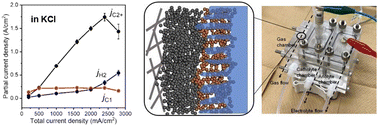
EES Catal., 2023,1, 9-16
https://doi.org/10.1039/D2EY00035K
Effect of particle size on the slurry-based processability and conductivity of t-Li7SiPS8
Slurry-processed t-Li7SiPS8 SE-sheets with larger thiophosphate particles show enhanced ionic conductivity and Li diffusivity, highlighting the importance of SE morphology and microstructure on the performance of all-solid-state batteries.

EES Batteries, 2025,1, 824-832
https://doi.org/10.1039/D5EB00005J
Tuning substrate temperature for enhanced vacuum-deposited wide-bandgap perovskite solar cells: insights from morphology, charge transport, and drift-diffusion simulations
Substrate temperature governs precursors adhesion, film morphology, and charge transport in vacuum-deposited perovskite films. Optimized growth at −20 °C yields efficient, thermally stable wide-bandgap perovskite solar cells.

EES Sol., 2025,1, 391-403
https://doi.org/10.1039/D5EL00021A
Industrialization of perovskite solar cell fabrication: strategies to achieve high-throughput vapor deposition processes
Vapor phase deposition processes hold great potential for industrializing the deposition of perovskite-based absorbers, offering a pathway to commercialization.

EES Sol., 2025,1, 404-418
https://doi.org/10.1039/D5EL00069F
Circular management of perovskite solar cells using green solvents: from recycling and reuse of critical components to life cycle assessment
Environmental needs and international regulations urgently ask for a robust practice for the recycling and reusing of critical components of perovskite solar cells (PSCs) to reduce the primary material demand and energy consumption.

EES Sol., 2025,1, 378-390
https://doi.org/10.1039/D4EL00004H
Barrier layer design reduces top electrode ion migration in perovskite solar cells
We report on an examination of mobile ion concentration (N0) in perovskite solar cells (PSCs) as a function of temperature and device architecture.

EES Sol., 2025,1, 345-355
https://doi.org/10.1039/D5EL00051C
Role of the monovalent cation in the self-doping of tin halide perovskites
The role of A-site cations (MA+, FA+, Cs+) in the defect chemistry of metal halide semiconductor is well-studied in lead halide perovskites; here we investigate it in the less explored tin perovskites.

EES Sol., 2025,1, 287-294
https://doi.org/10.1039/D5EL00010F
Superior sulfur infiltration into carbon mesosponge via chemical reaction for enhanced cycling stability in lithium–sulfur batteries
A mesoporous carbon scaffold rich in oxygen-functional groups, combined with a chemical sulfur loading method, enables effective sulfur confinement and stable cycling in high-performance Li–S batteries.

EES Batteries, 2025,1, 640-651
https://doi.org/10.1039/D5EB00039D
High-performance anode-less all-solid-state batteries enabled by multisite nucleation and an elastic network
A multi-metallic seed strategy integrated with an elastic polymer network is proposed to facilitate the room-temperature operation of anode-less all-solid-state batteries (ALASSBs), marking a significant step toward their practical application.

EES Batteries, 2025,1, 566-575
https://doi.org/10.1039/D5EB00050E
Ionic liquid electrolytes for enhancing the performance of lithium–sulfur batteries: a new approach to mitigating polysulfide dissolution and shuttle effects
Despite the potential for a greater energy density than lithium-ion batteries, polysulphide dissolution, the polysulphide shuttle effect, and lithium metal instability impede the commercialization of lithium–sulfur (Li–S) batteries.

EES Batteries, 2025,1, 541-554
https://doi.org/10.1039/D5EB00009B
Equal resistance single and bilayer films decouple role of solid electrolyte interphase from lithium morphology in batteries
Equal resistance single and bilayer films establish that thin film/electrolyte interfaces are more important for battery performance compared to copper/thin film interfaces due to their role in inorganic-rich solid electrolyte interphase formation.

EES Batteries, 2025,1, 585-597
https://doi.org/10.1039/D5EB00004A
Probing the electrochemical behaviour of lithium imide as an electrolyte for solid-state batteries
Lithium imide is an underexplored candidate for an all-solid-state battery electrolyte. Here it is shown to possess many desirable properties and unusual electrochemical behaviour, alongside its first operation in two lithium metal batteries.

EES Batteries, 2025,1, 527-540
https://doi.org/10.1039/D5EB00058K
Interdiffusion control in sequentially evaporated organic–inorganic perovskite solar cells
Humid atmosphere annealing enhances interdiffusion in sequentially evaporated perovskites, leading to improved crystallinity and reduced non-radiative recombination. This boosts PLQY and raises PCE to 21.0%, while enhancing stability under 85 °C and full-spectrum illumination.

EES Sol., 2025,1, 129-138
https://doi.org/10.1039/D5EL00017C
The promise of operational stability in pnictogen-based perovskite-inspired solar cells
The co-alloying of antimony and bismuth in a new CsMAFA-Sb:Bi perovskite-inspired material leads to enhanced microstructure, reduced ion migration, increased solar cell power conversion efficiency, and impressive operational stability.

EES Sol., 2025,1, 139-156
https://doi.org/10.1039/D5EL00029G
Li+ crosstalk-driven calendar aging in Si/C composite anodes
The calendar aging of Si-containing batteries is accompanied by prominent Li+ crosstalk, in which graphite was forced to compensate for the Li loss caused by Si. As a result, the self-discharge was inhibited by adjusting the Li+ crosstalk effect.

EES Batteries, 2025,1, 250-259
https://doi.org/10.1039/D4EB00040D
Mechanochemical pretreatment of tin iodide perovskite precursors: effects of grinding temperature and time on solar cell performance
We report the mechanochemical pretreatment of precursors for lead-free tin-based perovskite solar cells and highlight the effect of grinding temperature and time.

EES Sol., 2025,1, 78-88
https://doi.org/10.1039/D4EL00034J
Cation optimization for bifacial surface passivation in efficient and stable perovskite solar cells
This work studies bifacial surface passivation methods for efficient and stable perovskite solar cells through cation engineering. Combining MEO-PEAI with NH4SCN yields optimal passivation effectiveness at both interfaces.

EES Sol., 2025,1, 56-65
https://doi.org/10.1039/D4EL00013G
Incorporating thermal co-evaporation in current-matched all-perovskite triple-junction solar cells
Thermal co-evaporation of halide perovskites is a solution-free, conformal, scalable, and controllable deposition technique with great potential for commercial applications, particularly in multi-junction solar cells.

EES Sol., 2025,1, 41-55
https://doi.org/10.1039/D4EL00012A
High coordination-solvent bathing for efficient crystallization of MA-free triple halide perovskite solar cells
Using high coordination dimethyl sulfide, the anti-solvent bathing technique enables efficient extraction of precursor solvents in the perovskite wet film. The resulting highly crystalline films achieve a photovoltaic performance of 20.6%.

EES Sol., 2025,1, 30-40
https://doi.org/10.1039/D4EL00018H
Transport characterization of solid-state Li2FeS2 cathodes from a porous electrode theory perspective
This work investigates the cathode active material Li2FeS2 in all-solid-state batteries. Promising areal capacities can be achieved upon increasing the active material fraction and electrode thickness, but coming at the cost of rate capability.

EES Batteries, 2025,1, 172-184
https://doi.org/10.1039/D4EB00005F
Modulating the electronic structure of Ni(OH)2 by coupling with low-content Pt for boosting the urea oxidation reaction enables significantly promoted energy-saving hydrogen production
A urea-assisted water splitting electrolyzer based on Pt nanoparticle-anchored Ni(OH)2@Ni-CNF catalyst and Pt@Ni-CNF catalyst is constructed for effectively reducing the energy consumption of H2 production.

Energy Environ. Sci., 2024,17, 1984-1996
https://doi.org/10.1039/D3EE03398H
Cooperative tungsten centers in polymeric carbon nitride for efficient overall photosynthesis of hydrogen peroxide
Meticulously designed neighboring WOR and ORR active sites significantly enhance the overall photocatalytic synthesis of hydrogen peroxide.

Energy Environ. Sci., 2024,17, 1520-1530
https://doi.org/10.1039/D3EE03032F
Operando monitoring of gas bubble evolution in water electrolysis by single high-frequency impedance
A single frequency impedance method is introduced, based on an optimum high frequency of minimum phase and faradaic processes, to monitor gas bubble evolution during water electrolysis in operando.

EES Catal., 2023,1, 998-1008
https://doi.org/10.1039/D3EY00182B
Pathways to enhance electrochemical CO2 reduction identified through direct pore-level modeling
CO2 reduction in gas diffusion electrodes is modeled using direct numerical simulation, with species transport resolved in 2D throughout the catalyst layer, including steric effects. Modeling yields numerous ways to optimize GDE performance.

EES Catal., 2023,1, 704-719
https://doi.org/10.1039/D3EY00122A
Unraveling the reaction mechanisms for furfural electroreduction on copper
Combining theory and experiment, we unveil the mechanisms for furfural electroreduction on copper and provide a rationale to tune reaction conditions to increase activity towards value-added products.

EES Catal., 2023,1, 539-551
https://doi.org/10.1039/D3EY00040K
Reversible adsorption with oriented arrangement of a zwitterionic additive stabilizes electrodes for ultralong-life Zn-ion batteries
A zwitterionic additive (L-CN) with a positively charged quaternary ammonium site and multifunctional polar groups was employed to achieve ultralong-life Zn-ion batteries.
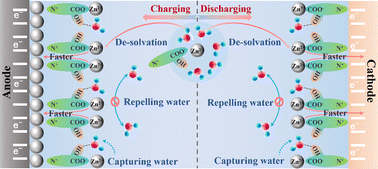
Energy Environ. Sci., 2023,16, 2684-2695
https://doi.org/10.1039/D3EE00982C
Regulating active hydrogen adsorbed on grain boundary defects of nano-nickel for boosting ammonia electrosynthesis from nitrate
The grain boundary defect engineered Ni nanoparticles has been explored for boosting selective nitrate electroreduction to ammonia, and its NH3 generation rate is much higher than those of the reported copper or noble metal-based catalysts.
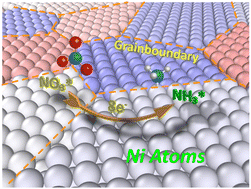
Energy Environ. Sci., 2023,16, 2611-2620
https://doi.org/10.1039/D2EE04095F
A hydrated deep eutectic electrolyte with finely-tuned solvation chemistry for high-performance zinc-ion batteries
A hydrated deep eutectic electrolyte with a water-deficient solvation structure and reduced free water in bulk solution is proposed, resulting in highly reversible and stable Zn anodes.

Energy Environ. Sci., 2023,16, 2540-2549
https://doi.org/10.1039/D3EE00462G
A high-entropy atomic environment converts inactive to active sites for electrocatalysis
An electronegativity-dominant high-entropy atomic environment regulation strategy was developed to manipulate the electrocatalytic properties by tailoring the competitive adsorption sites in HEA NPs.
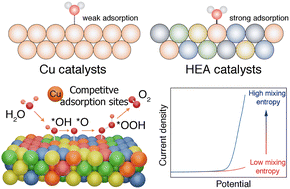
Energy Environ. Sci., 2023,16, 619-628
https://doi.org/10.1039/D2EE03185J
Effect of charge selective contacts on the quasi Fermi level splitting of CuGa3Se5 thin film photocathodes for hydrogen evolution and methylviologen reduction
The defect-copper chalcopyrite CuGa3Se5 is a promising photocathode material for solar hydrogen generation. Here we assess its performance with photoelectrochemical measurements and vibrating Kelvin probe surface photovoltage spectroscopy.

EES Catal., 2023,1, 74-83
https://doi.org/10.1039/D2EY00062H
Direct carbonate electrolysis into pure syngas
In a direct carbonate electrolysis system, a CO2 diffusion layer enabled the production of CO-rich syngas.
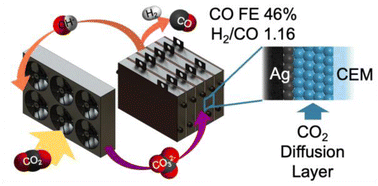
EES Catal., 2023,1, 54-61
https://doi.org/10.1039/D2EY00046F
High-efficiency electrosynthesis of urea over bacterial cellulose regulated Pd–Cu bimetallic catalyst
PdCu/CBC exhibited a remarkable Rurea of 763.8 ± 42.8 μg h−1 mgcat.−1 at −0.50 V (vs. RHE) and an exceptional FE of 69.1 ± 3.8% at −0.40 V (vs. RHE). Taking advantage of operando spectroscopy characterization, the C–N coupling mechanism was verified.
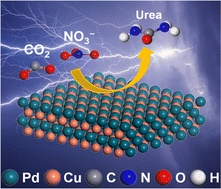
EES Catal., 2023,1, 45-53
https://doi.org/10.1039/D2EY00038E
About this collection
This collection contains some of our most influential and groundbreaking research published in the EES Family journals, including our newest launches EES Solar and EES Batteries. This collection covers key topics from pioneering authors all over the world, from electro- and photocatalysis, to hydrogen production, batteries, solar cells and more.